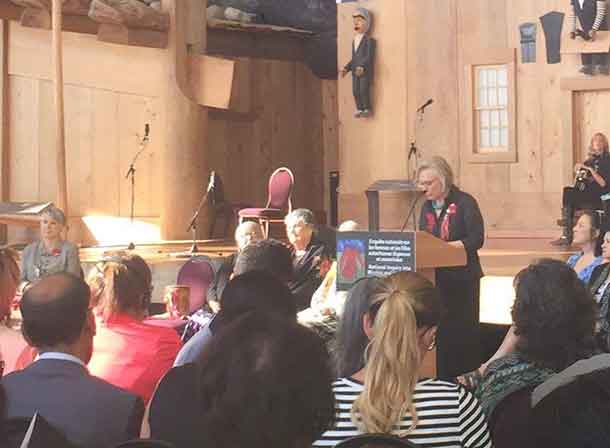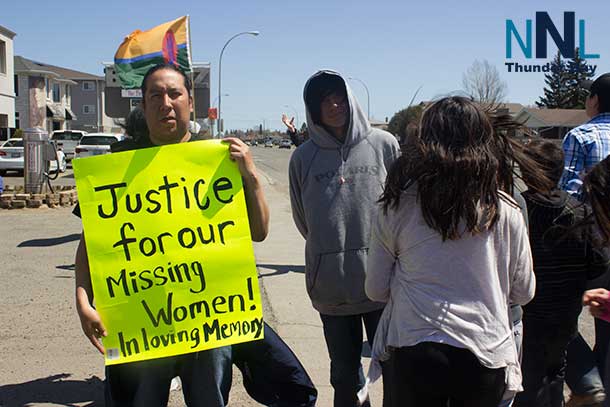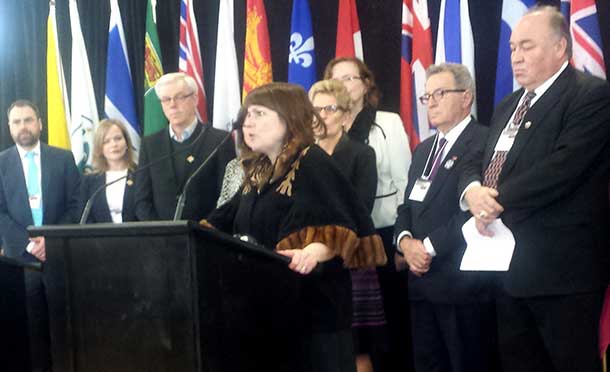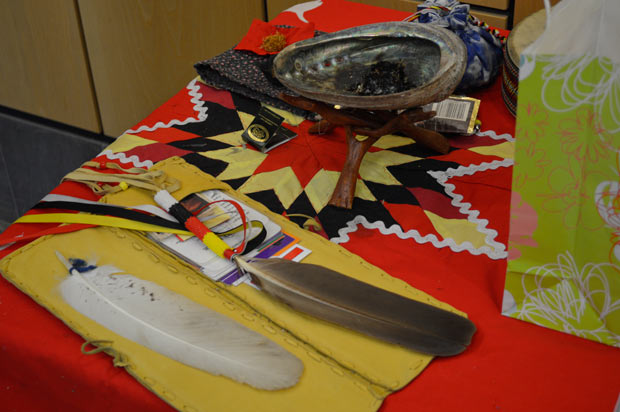
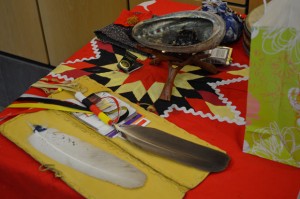
OTTAWA – With ceremony, prayers and hope, the National Inquiry into Murdered and Missing Indigenous Women and Girls was launched this morning in Ottawa. The efforts have taken a long time to get to this point, and have included pre-inquiry study and efforts including meetings across Canada, including a session in Thunder Bay. Getting to this stage has been an effort.
The Native Women’s Association of Canada’s (NWAC)’s 11-year campaign for a National Inquiry is a steadfast reality as a result of the Government of Canada’s announcement today on the launching of the National Inquiry into Missing and Murdered Indigenous Women and Girls.
“We welcome the leadership shown by the Federal government today. After 11 years of NWAC listening to the families of the missing and murdered Indigenous women and girls in Canada, we are pleased that we now have a government who is prepared to listen and act. We want to acknowledge the great responsibility that the Commissioners have undertaken and commit to support them as they start this work. We recognize that five people cannot represent the diversity of our country and NWAC will work with the National Inquiry to ensure that all voices that need to be heard will be heard,” stated Dawn Lavell-Harvard, President of NWAC.
NWAC had 10 key points that we were looking to ensure were part of the Inquiry.
- Hear from the families in respectful and culturally appropriate ways.
- Provide families that want to pursue their cases through a justice system, some mechanism to do that.
- Provide families with supports throughout the process including before they present to the Inquiry, during the Inquiry and after they present to the Inquiry, based on a trauma informed approach.
- Validate the knowledge that we have acquired as we have engaged and talked with the families for the last 11 years. Specifically:
- The underlying issues that have resulted in the number of missing and murdered Indigenous women in this country is a direct result of historical and systemic issues;
- Recognize the systems that need to change, including the Child welfare system and justice system
- Consolidate the research that has been done over the last eleven years including our research and the research done by Amnesty International.
- Establish a research table and advisory tables to support the work.
- Make informed recommendations based on the knowledge from the families and the research.
- Directly engage NWAC in the Inquiry, as appropriate, and based on our role as National representatives of Indigenous women in Canada and as leaders in this issue for over eleven years.
- Establish working relationships with the provinces to address the key issues.
- Establish working relationships with the justice partners to address the key issues.
In reviewing the Terms of Reference, there are four areas that we have some concern about.
- The trauma informed and culturally based counseling appears to be limited to “the duration of their appearance before the Commission.” Trauma does not have a timeframe and we asked that families and survivors be provided with trauma informed and culturally based counselling services in their community as they get ready to present to the Inquiry, at the Inquiry and after presenting to the Inquiry. We learnt a lot from the Truth and Reconciliation Commission including that the telling of the story of trauma can further trigger trauma. Let’s use those lessons that we learned.
- There does not appear to be an opportunity for families to pursue or reopen cases through the justice system. In fact, for families who want to pursue cases or re-open ones that have been part of the justice system, the Terms of Reference direct that the support the Commissioners can offer is to redirect them to the appropriate provincial or territorial victim services. Families are not looking for mainstream counseling services through victim services but justice. This is a missed opportunity.
- There is no mention of the role of the provinces and territories and yet we know that some of the systemic issues will require provincial discussions, namely police services and the child welfare system. We cannot ignore what we know. Girls have described that they were sex trafficked from group homes and motels that are part of the child welfare system. We have a disproportionate number of Indigenous people who are in the criminal justice system. These issues are all interrelated and our expectation is that one reason we are having the Inquiry to address how these issues relate to violence against Indigenous women and girls.
- There is no explicit mention of the need to work with the justice partners in order to make appropriate recommendations to ensure that there are changes in that system. We cannot ignore the fact that many family members or survivors of violence do not feel that they were treated respectfully or fairly by the justice system.
NWAC will be continuing our work to end violence against Indigenous women and girls.
- NWAC will be monitoring the work of the Inquiry and will provide ongoing feedback.
- NWAC will continue to track missing and murdered Indigenous women and girls. Sadly, since the RCMP released their updated report in December 2015 there have been 14 other women and girls who have gone missing or been murdered.
- NWAC will be monitoring the progress of the CBC in its investigations of 34 cases across Canada that involve the death or disappearance of Indigenous women, and where families of the women say they do not accept the findings of police. These cases have something to teach us and we will be advocates for the changes that need to happen in the justice system and in our society.
- We will also continue to work on the issues of sexual violence, domestic violence and human and sex trafficking that are part of violence against Indigenous women.
The Native Women’s Association of Canada (NWAC) is founded on the collective goal to enhance, promote, and foster the social, economic, cultural and political well-being of First Nations and Métis women within First Nation, Métis and Canadian societies. As a national organization representing Aboriginal women since 1974, NWAC’s mandate is to achieve equality for all Aboriginal women in Canada.

